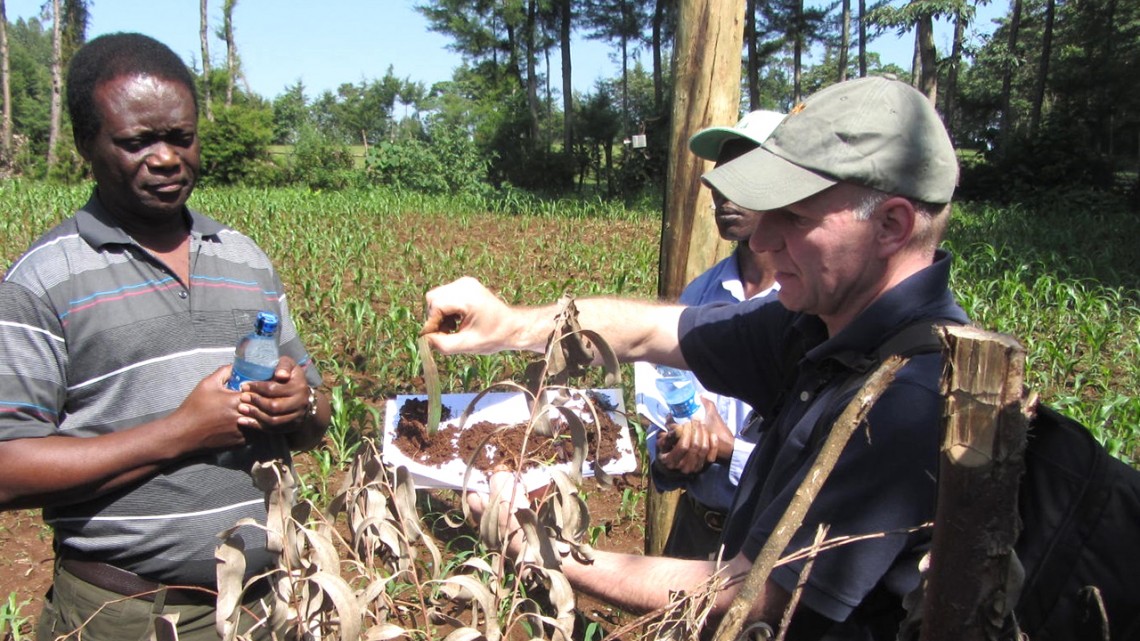
Johannes Lehmann, right, speaks with extension officials in western Kenya about soil organic matter.
CO2 soil sequestration plan aims to relieve atmospheric warming
By Blaine Friedlander
Carbon dioxide is polluting Earth’s atmosphere at an alarming rate, pushing the atmosphere’s average temperature ever higher. But an international group of scientists co-led by a Cornell professor reports that solutions for sequestering that carbon might literally be right under our feet – but the time to act is now.
“The window of opportunity to sequester atmospheric carbon into the soil is rapidly closing. Scientists are breaking out of the academic box, and we are translating science into action,” said Johannes Lehmann, Cornell professor of soil science and a lead author on a commentary published Jan. 19 in Nature Sustainability that suggests a global plan for implementation.
While policymakers and business investors may believe that impounding soil carbon is a difficult task, global warming stakeholders who met in 2018 at London’s Chatham House, the Royal Institute of International Affairs, created a road map for making carbon sequestration politically and economically viable. The meeting was funded by Cornell’s Atkinson Center for a Sustainable Future and The Nature Conservancy. The meeting was co-led by Lehmann, an Atkinson fellow, and soil scientist Deborah Bossio of The Nature Conservancy.
At the 2015 Conference of the Parties (COP21) of the United Nations Framework Convention on Climate Change (UNFCCC) meetings, the French government proposed an annual 0.4 percent global increase in soil organic carbon to offset the net increase in atmospheric carbon dioxide concentrations, said Lehmann.
“This initiative made soil organic carbon a highly visible political issue in climate science, and [it] has been promoted by many governments on a high level,” Lehmann said. “However, significant political hurdles remained. A broad consensus on how to achieve carbon sequestration targets was lacking. And financial mechanisms were nascent – at best – with no coordinated effort in sight.”
But as atmospheric average temperatures rise, momentum for action on soil organic carbon now grows in political, financial and technical circles.
In the Nature commentary, the group ranked the three top priorities for the global agenda:
- develop an overarching case and vision for action, led by political champions;
- create a strong business case for sequestration; and
- establish a track record of sequestration success among public and private entities over the long term.
Global leaders must make soil organic carbon a priority at the center of discourse, according to the researchers.
“From a climate perspective,” the researchers wrote, “some countries would be more interested in the role of soil organic carbon in climate change adaptation, while [other countries] would be motivated by the untapped potential for meeting national mitigation targets.”
According to the commentators, a stronger business case among public and private investors will help to generate the level of finance that will bring improved soil management globally. The World Business Council for Sustainable Development is building a corporate business case for investing in soil health.
Farmers and land managers must incorporate building soil organic carbon within their day-to-day management activities, the scientists wrote. Investments in soil organic carbon become valuable when farmers see: enhanced productivity; improved risk management, such as resilience to drought; market access; financial returns to carbon assets; and government support.
“From a farmer’s perspective, an attractive business case does not necessarily need to deliver near-term cash, but must add value to the farm over a multiyear planning horizon,” the group said. “Soil organic carbon can also deliver private value beyond the farm, [such as] influencing residential property values.”
Current debates over whether soil organic carbon can mitigate climate change, how to achieve the carbon sequestration potential and how important synergies are for food security will guarantee that these ideas have a broad audience, Lehmann said.
Media Contact
Get Cornell news delivered right to your inbox.
Subscribe

